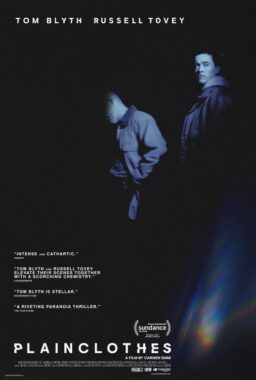From Karim Drissi, Sacramento, CA:
“…in a way the twists are the real subject.” — Ebert
I agree that, in a way, twists are part and parcel of David Mamet’s art. Moreover, the twists or cons or charades that take place in “Redbelt” actually have even greater significance when viewed within the context of Mamet’s canon. Allow me to elaborate. The following paragraphs contain SPOILERS in regards to not only “Redbelt,” but also previous Mamet features (i.e., “Heist” and “Spartan“). Discretion is advised.
SPOILERS FOLLOW…
“I’m ending the charade.” — Mike Terry in “Redbelt”
With the release of “Redbelt,” Mamet’s core theme of identity has finally come full circle. From Lindsay Crouse’s character in “House of Games” to Joe Mantegna’s character in “Homicide,” Mamet’s protagonists have always wrestled with their identities. Who are their true selves? Are their current ideals and allegiances just and proper? To be sure, Mamet has now completed his “honor code” trilogy, which consists of three films that feature one word titles (“Heist,” “Spartan,” and “Redbelt” — leave it to wordsmith Mamet to make the two word term “red belt” into one word). This trilogy features three protagonists who are trying to live their lives by a particular set of morals and ethics. Specifically, the principles of the protagonists in question are put to the test by various machinations in the narrative, and the protagonists must choose to either remain true to their ideals or acquiesce to the demands of the ever-changing modern world around them.
In “Heist,” Joe is an old school thief whose tactics and methods are put to the test by a new breed of (immoral) criminal (i.e., Sam Rockwell’s character et al). In “Spartan,” Bobby is a Special Ops officer whose ethics are put to the test by government officials who mean to use his skills for political gain. Lastly, in “Redbelt,” Mike is a martial arts instructor whose allegiance to the way of the warrior is put to the test by those who mean to use his skills and knowledge for financial gain.
With “Redbelt,” Mamet finally allows one of his protagonists to break through his self-crafted glass ceiling of fakery and deception. This is in sharp contrast to many of his works, which occasionally end on a note of uncertainty. For example, the last shot of “The Spanish Prisoner” makes one wonder whether the con was actually put to rest or whether it will continue long after the screen has faded to black. While the protagonists of the first two entries in the above trilogy do in fact challenge Mamet’s charade, they fail to stop the charade once and for all by the end of the film.*
In “Heist,” the charade continues in a pickup truck moving in the opposite direction of Joe’s vehicle. In Spartan, the charade continues on a slew of television sets in front of Bobby. Moreover, these two protagonists are punished for challenging the charade in question by continuing to adhere to their codes of honor. Both protagonists are weaker and lonelier for having challenged the dubiousness of their surroundings. Specifically, Joe loses his significant other and Bobby loses his homeland (both lose one or more confidants to death). While Mamet empathizes with them on this point (esp. Bobby in “Spartan”), he nevertheless keeps them well below the glass ceiling of his cinematic chicanery.
Interestingly enough, Mike is the first Mamet protagonist to be rewarded for adhering to his code of honor.** Many Mamet regulars who act in “Redbelt” are baffled by Mike’s insistence on gumming up the works of Mamet’s chicanery: “What kind of stupid motherf***er pawns a watch he got from Chet Frank.” Indeed, they are dumbfounded as to why Mike refuses to go along with the ebb and flow of Mamet’s deceptions. Nevertheless, Mike wishes to break through Mamet’s facades and, needless to say, Mamet makes him work hard for his reward.
With “Redbelt,” Mamet is able to live through his protagonist, whose purity surely only exists in the movies (Mamet’s own “Redbelt “deal with Sony Pictures Classics requires that he make “Joan of Bark: The Dog that Saved France” as his next feature). During the climax, Mamet cuts away to key characters in the film, many of whom are portrayed by Mamet regulars who have partaken the cons of his previous films (from Ricky Jay to Rebecca Pidgeon, there are at least eight Mamet regulars that appear in the film. Moreover, the film is dedicated to Mamet regular and close friend Christopher Kaldor, who recently passed away). It is as if these Mamet regulars are witnessing history — the first Mamet protagonist to completely cut through the foliage of fakery once and for all.
In the end, the character of Mike shatters Mamet’s charade in “Redbelt,” and he uses the bard’s own words against him in order to do so by constantly uttering the following mantra: “There is no situation you cannot escape from. You know the escape.” Actually, Mike’s mantra would perhaps read better as follows: “There is no situation you cannot escape from [with your dignity still intact]. You know the escape.” Indeed. Way to go, Mike.
*Sure, the protagonists of the first two entries do indeed accomplish the objective given to them by the narrative. In “Heist,” Joe gets the gold; in “Spartan,” Bobby rescues the girl. Still, the completion of these narrative objectives does not negate the fact that both characters continue to live in a world in which Mamet’s deceptions are still in play at the end of the film.
**Sure, one could argue that Mike’s rewards at the end of the picture are in fact dubious. Indeed, he loses two confidants along way, and his constant reiteration that belts are nothing more than a mechanism by which to keep one’s pants up may downplay his triumph during the film’s finale. Still, the ending is one of triumph for what his rewards symbolize. In other words, the rewards in question are a tangible embodiment of his accomplishment of mind, body, and spirit in terms of his adherence to his honor code of morals and ethics. Moreover, his rewards are two-fold for a reason: The first is an acknowledgement by his peers, the second is an acknowledgement by his mentor. The former is for show, the latter is much more meaningful.











